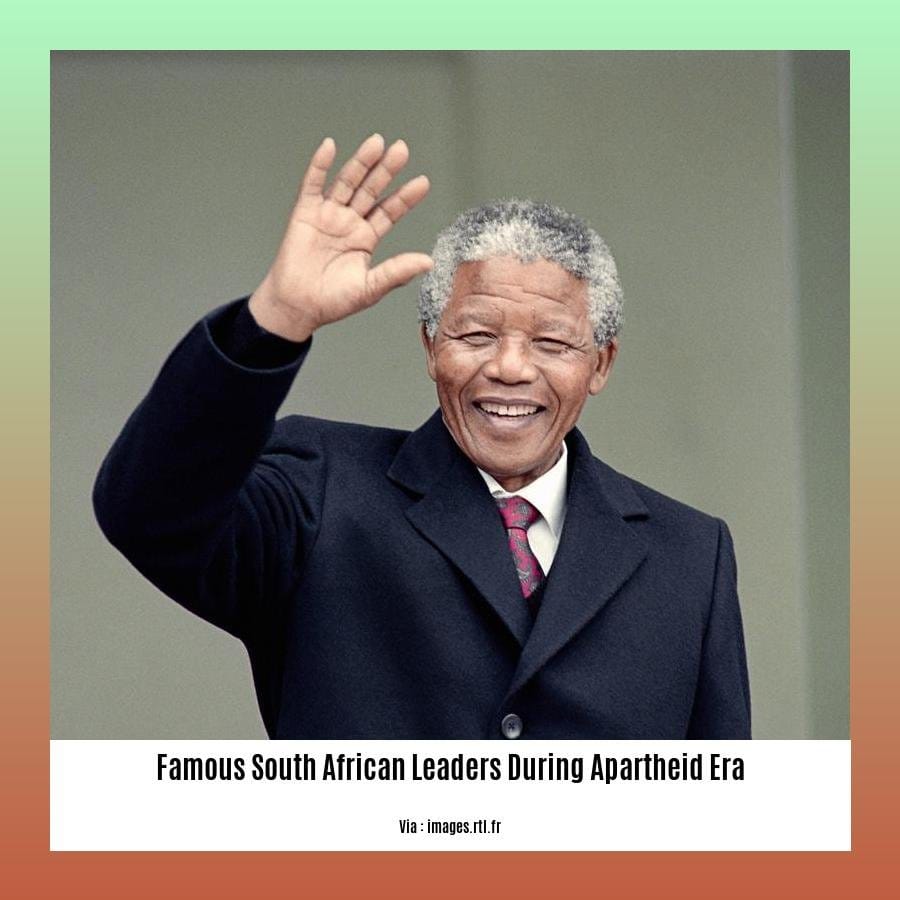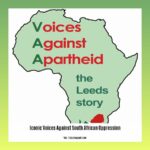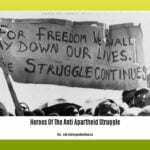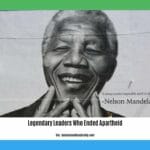Delve into the lives of renowned leaders who left an indelible mark on South Africa’s history during the apartheid era. This article showcases the individuals whose unwavering determination and resistance against an oppressive regime paved the way for a more just and equitable society. Discover the captivating stories of those who fought tirelessly for freedom, equality, and human rights, leaving a legacy that continues to inspire generations.
Key Takeaways:
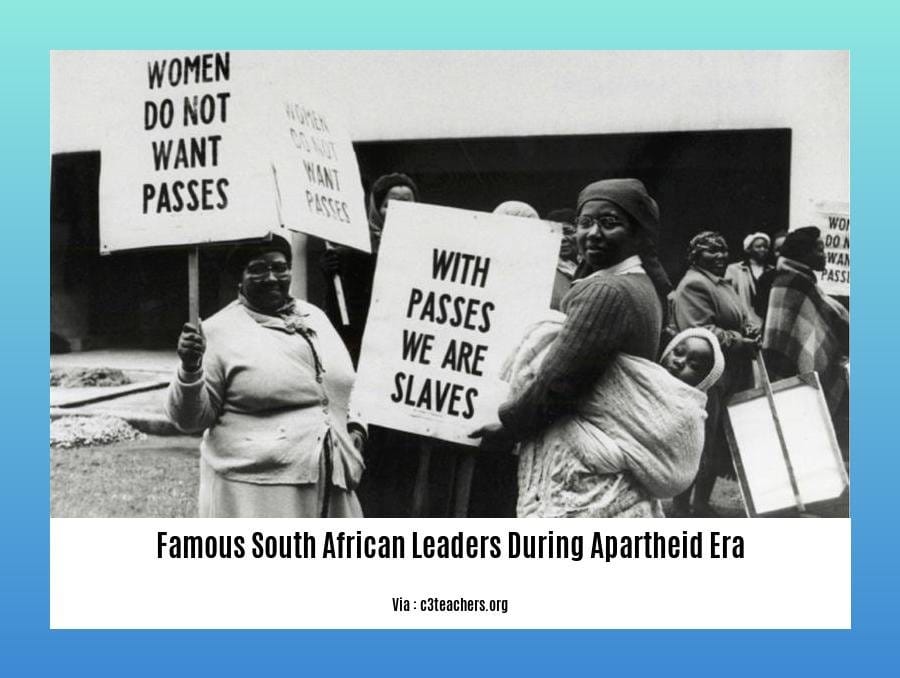
- Winnie Madikizela-Mandela was a prominent anti-apartheid activist.
- David Webster, Helen Suzman, Solomon Mahlangu, Steve Biko, Albertina Sisulu, Lillian Masediba Ngoyi, and Helen Joseph were other notable figures who fought against apartheid.
- These individuals engaged in protests, speeches, and political organizing to oppose racial segregation.
- Despite facing imprisonment, torture, and exile, they remained resolute in their fight for freedom.
Famous South African Leaders During the Apartheid Era
We delve into the remarkable stories of famous South African leaders during apartheid era, who courageously fought against racial segregation and oppression.
Apartheid, a cruel system of racial discrimination, was the defining feature of South Africa for decades. Amidst this darkness, beacons of resistance emerged, leading the fight for freedom and equality.
Nelson Mandela
The iconic face of the anti-apartheid movement, Mandela spent 27 years in prison for his unwavering opposition to apartheid. His indomitable spirit and message of reconciliation inspired a nation.
Winnie Madikizela-Mandela
Mandela’s wife, Winnie, was an activist in her own right. Facing arrest and torture, she became a symbol of resilience and hope for the oppressed.
Steve Biko
The founder of the Black Consciousness Movement, Biko preached self-reliance and black pride. His tragic death in police custody sparked widespread outrage.
Archbishop Desmond Tutu
A Nobel Peace Prize laureate, Tutu was a passionate advocate for peace and reconciliation. His sermons and activism were a powerful force against apartheid.
Helen Suzman
A lone voice in Parliament, Suzman fearlessly spoke out against apartheid. Her tireless efforts helped expose the brutalities of the regime.
These are just a few of the many famous South African leaders during apartheid era who dedicated their lives to the struggle for justice. Their courage, sacrifice, and unwavering belief in a better future paved the way for a democratic South Africa.
Interested to know more about who championed the fight against apartheid, the influential voices, and legendary leaders who helped end this system of oppression? Read our insightful articles on anti-apartheid leaders in South Africa, influential voices against South African apartheid, and legendary leaders who ended apartheid.
Top 20 Freedom Fighters In Africa
During the dark era of apartheid in South Africa, courageous individuals emerged as beacons of hope and resistance. Their unwavering determination and sacrifices paved the way for a more just and equitable society. Let’s recall the stories of some of the most influential freedom fighters who left an indelible mark on history:
Lilian Ngoyi: A pillar of the African National Congress (ANC), Ngoyi played a pivotal role in the Defiance Campaign, challenging unjust apartheid laws head-on.
Steve Biko: The heart and soul of the Black Consciousness Movement, Biko’s philosophy of self-reliance and black pride inspired a generation to fight for liberation.
Nelson Mandela: The globally renowned anti-apartheid icon, Mandela’s steadfast resistance and unwavering spirit during 27 years of imprisonment became a symbol of the struggle.
Desmond Tutu: An Anglican cleric who used his voice to condemn apartheid both locally and internationally, Tutu’s eloquent sermons and tireless advocacy made him a respected figure worldwide.
Winnie Madikizela-Mandela: Nelson Mandela’s wife and a fierce anti-apartheid activist, Madikizela-Mandela faced imprisonment and exile, becoming a symbol of resilience and strength.
Key Takeaways:
- These freedom fighters displayed unwavering courage and determination in the face of adversity.
- Their sacrifices paved the way for a more just and equitable South Africa.
- Their legacy continues to inspire generations and remind us of the power of resistance against oppression.
Most Relevant URL Source:
Global Citizen: 6 Women Who Helped Lead South Africa to Freedom
Who Were the South African Heads of Government?
Key Takeaways:
- The heads of government in South Africa from 1910 to 1961 were the Monarchs of the United Kingdom, represented by Governors-General.
- From 1961 to 1984, South Africa had Prime Ministers as heads of state.
- State Presidents served as heads of state from 1984 to 1994.
- Nelson Mandela became South Africa’s first democratically elected President in 1994.
South Africa’s history is replete with remarkable leaders who fought against apartheid’s oppressive system. These courageous individuals dedicated their lives to the pursuit of justice and equality, leaving an indelible mark on the nation’s history. From the early days of resistance to the eventual dismantling of apartheid, these leaders played pivotal roles in shaping South Africa’s destiny.
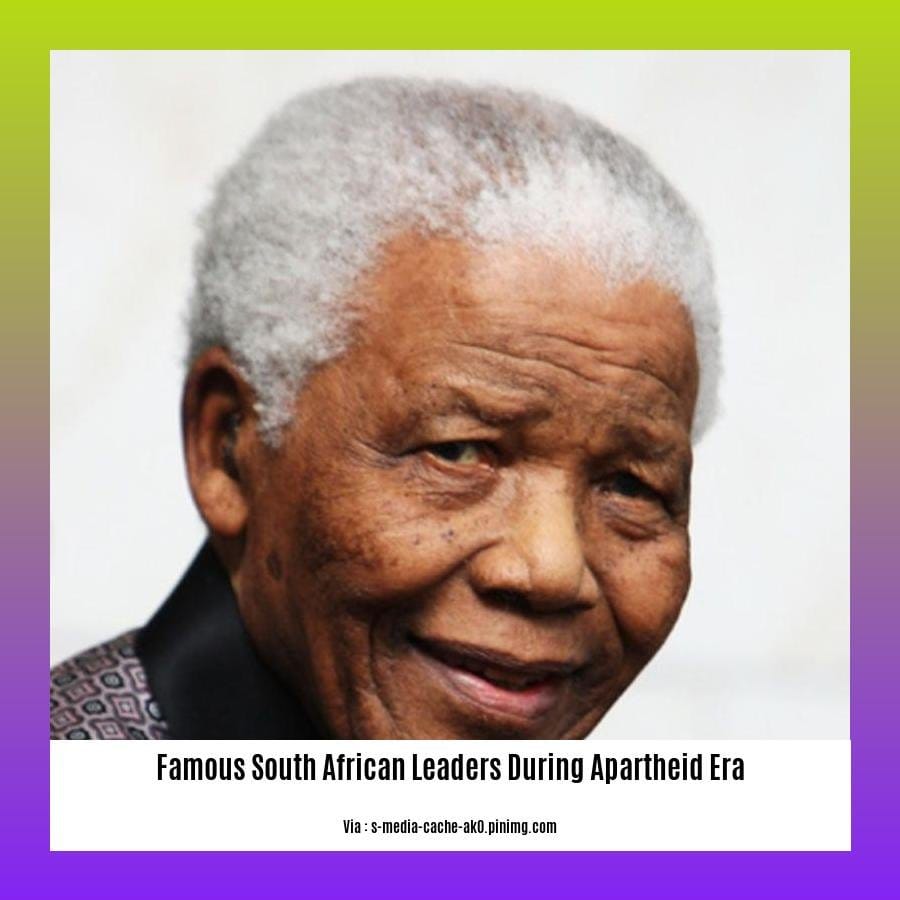
FAQ
Q1: Who were the key figures in the anti-apartheid movement in South Africa?
A1: Lilian Ngoyi, Steve Biko, Nelson Mandela, Desmond Tutu, and Winnie Madikizela-Mandela were some of the key figures in the anti-apartheid movement in South Africa.
Q2: What were the roles of women in the anti-apartheid movement?
A2: Women played a crucial role in the anti-apartheid movement, organizing protests, giving speeches, and participating in political organizing. Notable women freedom fighters include Lillian Ngoyi, Albertina Sisulu, and Helen Joseph.
Q3: What was the significance of the Defiance Campaign?
A3: The Defiance Campaign was the first and largest protest against apartheid laws. It was led by the African National Congress (ANC) and involved thousands of people across South Africa.
Q4: How did Steve Biko contribute to the anti-apartheid movement?
A4: Steve Biko was instrumental in the Black Consciousness Movement, which aimed to instil pride and self-reliance among black South Africans and to challenge the apartheid system.
Q5: Who were the leaders involved in South Africa’s transition to democracy?
A5: Key leaders involved in South Africa’s transition to democracy include Nelson Mandela, F.W. de Klerk, and Desmond Tutu. Mandela became the first democratically elected president of South Africa in 1994, after spending 27 years in prison for his opposition to apartheid.
- Georgia Platform: A Southern Strategy, 1850s - March 31, 2025
- How many weeks is 40 days: Quick Conversion Guide for Accurate Results - March 31, 2025
- How many feet is 300 meters? 984 Feet: Understand Length Conversions Easily - March 31, 2025
